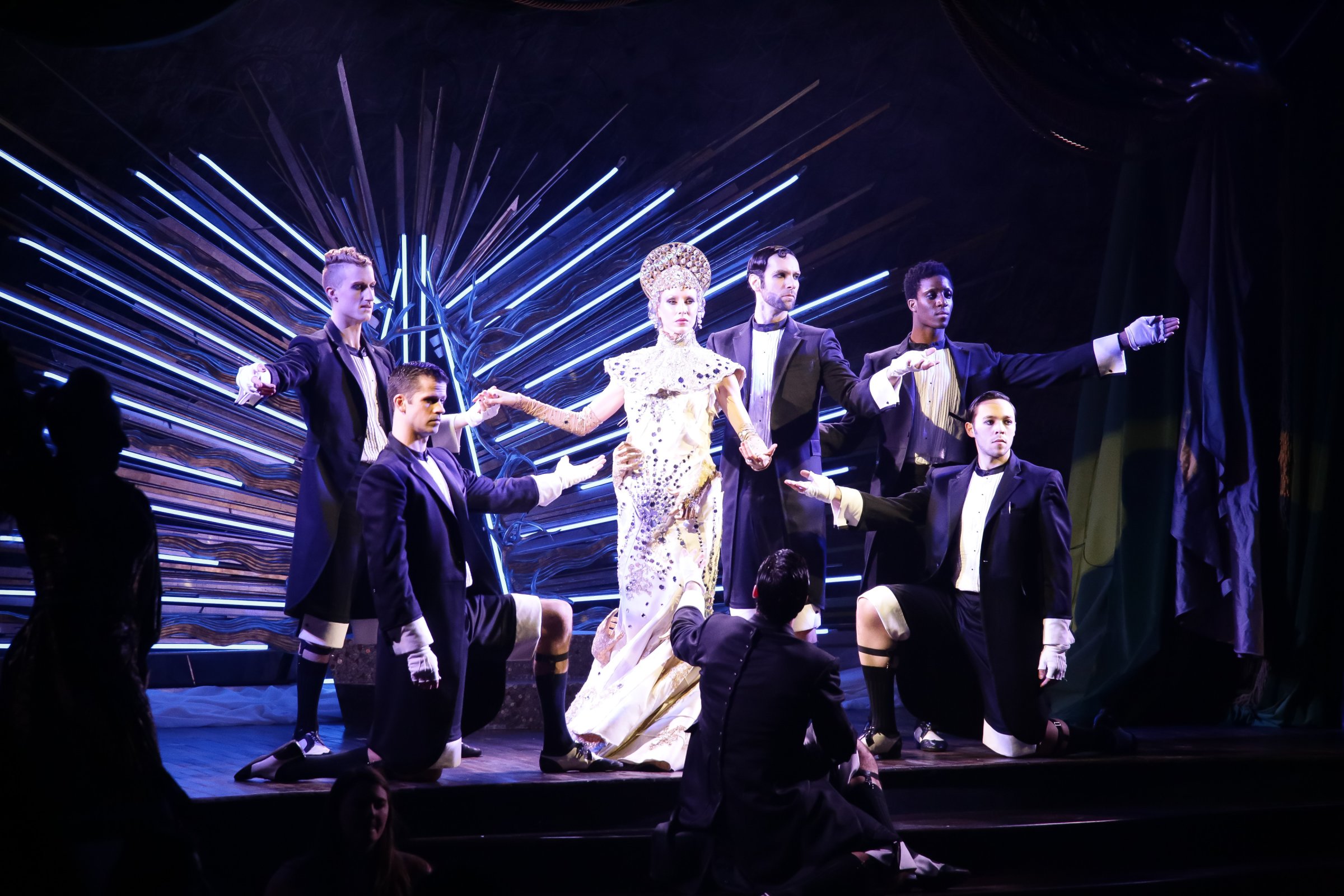
The audience gets treated like royalty at Queen of the Night. After you descend a couple of flights to the basement of New York’s Paramount Hotel, an usher personally escorts you inside a cavernous ballroom-cum-supper club (the refurbished Diamond Horseshoe from the 1930s). For the next half-hour or so, you get free run of the premises, a complimentary drink at the bar and a lot of attention from the slinky, sleekly dressed performers wandering about. You’ll get fondled and fawned over, maybe dragged off for a private encounter, or led to center stage to make an offering to the Queen, who stands regally in a blue sheer gown and wearing a giant white two-faced mask. Eventually, you’re led to one of the communal dinner tables, where you’re fed a surprisingly robust meal of beef ribs, lobster or suckling pig. (Each table gets a different dish, and patrons are encourage to trade.)
The occasion for these festivities? That’s a little harder to say. The show (the creation of Randy Weiner, producer of the downtown theater hit Sleep No More) supposedly draws characters from Mozart’s The Magic Flute, but no ordinary theatergoer without production notes will be able to tell. Mainly it’s a series of circus acts and other pantomimed stunts — jugglers, acrobats, rope climbers, a fellow with a bullwhip threatening a naked girl — sort of a highlight reel of Cirque du Soleil, downtown performance pieces like Traces and Blue Man Group and 1970s softcore porn, all set to a pulsating rock underscore and a decadent-deco mise-en-scene. Except for a brief appearance by a Vegas-style emcee, there is virtually no dialogue, and the Queen has little to do except for a climactic solo dance, in which she writhes in anguish, tosses her blonde hair wildly, and shows off more body flexibility than any of the ice dancers in Sochi.
Queen of the Night is the latest entry in what is fast becoming an epidemic of “immersive” theater in New York and around the country. The show opened just a few days after another interactive piece, Stop Hitting Yourself, from the Austin-based theater collective Rude Mechs. That show, too, wallows in decadent deco-era opulence — ornate chandeliers, gold statuary — and there’s even another Queen, though this one is a dowager played by a guy in silver wig, who travels around the stage on a miniature scooter.
Stop Hitting Yourself is a more conventional theater piece (actors on a stage, audience members in seats, actual dialogue), though it doesn’t make much more sense. It opens with a bedgraggled, half-naked man lying onstage and pleading for someone to help him get up. He’s the narrator, a self-described “wild man” who is dragged into some sort of society-ball contest, in which he’s dressed to the nines and taught etiquette, amid a circle of rich swells who might have stepped out of a 1930s Mitchell Leisen film. All of this is the jumping-off point for some lively song-and dance numbers, and interludes in which the actors step out of character and coax members of the audience onstage. One patron is told to bark like a dog. A second is asked to show off his belly button. A third person is called up and asked to strip naked. When he does, you know you’ve been had.
The explosion of immersion shows can be traced to the phenomenal success of Sleep No More, the Punchdrunk company’s riff on Macbeth, in which theatergoers don masks and wander through a spooky abandoned hotel, occasionally encountering shards of Shakespeare. The show has been drawing sellout crowds for nearly three years in New York City, and has inspired more producers and theater companies to lure hip young audiences into the theaters by getting them out of their seats.
It’s a welcome trend. Immersive theater is a healthy reaction to the stodginess and predictability of so much conventional theater, and it’s provided a new palate for innovative choreographers and designers (Queen of the Night is directed by Christine Jones, a set designer for Broadway’s American Idiot and the Met’s Rigoletto). It’s also a reflection of the increasingly fuzzy line, in the age of YouTube, between performer and audience. The amazing thing about the patrons who become part of the show in Queen of the Night is how willingly and well they play their parts. The fellow who drops his underpants onstage in Stopping Hitting Yourself is, I have to assume, an audience plant — but the scary thing is that I’m not entirely sure.
What’s missing from all the fun and games — not to be a spoilsport! — is a little content. As impressive as Sleep No More is as a piece of installation art, any glimpses of coherent drama (or Macbeth) are few and random. Stop Hitting Yourself includes some pretentious babble about environmental responsibility and the greed of society, but it’s too muddled and haphazardly inserted to carry any real weight. After Queen of the Night’s revels are over (and the diners have tossed their cutlery into giant bins and taken a final turn on the dance floor), it’s hard to know what to take away from the evening, aside from a good pork dinner and a lot of new friends in heavy mascara. If the Queen herself knows, she’s not talking.
More Must-Reads from TIME
- Cybersecurity Experts Are Sounding the Alarm on DOGE
- Meet the 2025 Women of the Year
- The Harsh Truth About Disability Inclusion
- Why Do More Young Adults Have Cancer?
- Colman Domingo Leads With Radical Love
- How to Get Better at Doing Things Alone
- Michelle Zauner Stares Down the Darkness
Contact us at letters@time.com